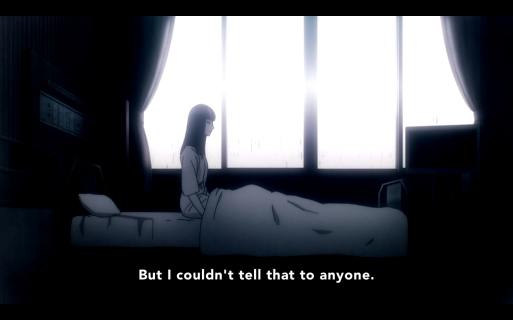-Spoilers Ahead! You have been warned-

After death, humans are either sent to the void or reincarnated. But for some, at the instant of death, they have their memories wiped clean and are sent to Quindecim, a nether-worldly bar attended by the mysterious white-haired Decim. He challenges them to play the Death Game, wherein they wager their lives and reveal their true natures. Decim plays the role of an arbiter, making the final decision as to who wins and who loses; who will go to the void, and who will be reincarnated. This series discusses the concept of death using a game format. The game is a means for the arbiter to fish out the “darkness within peoples’ hearts” and use that to define a person’s values. The victor of the game in this case is not important. It is the reveal of the true self that matters. Themes such as revenge, alienation and justice are also built up and expanded upon.

“Welcome to the Quindecim.”

Decim’s reply when questioned on the fairness of his judgement.
In addition, there is a level of maturity seldom seen in similar anime in the character of Onna. Death Parade delves deep into Onna’s past and tries to explain the reason behind her suicide. Rather than a straightforward “she commits suicide because she cannot skate again” explanation, we are presented with a very realistic situation: despite losing her forte, she is still determined to persevere and focus on the more important things in life. However, it is only then that she realizes just how little the people in her life truly understand her. Rather than helping her to move on, all her friends, including her own mother, harp on her loss and console her endlessly, as if that is all she means to them. Because of this, it dawns upon her that since no one can understand each other, everyone is a stranger and nothing matters in her life anymore. These leads to her eventual existential crisis and the decision to end her life.This viewpoint is debated extensively in the last episode when we see Onna breaking down because she is unable to bring herself to kill another person in exchange for reviving her body and living on again. Her refusal to kill disproves her notion that people do not care for one another. The flashbacks of previous games shows her that everyone has had emotional ties to someone in their life and are at times unable to show it until it is too late.

Chiyuki (a.k.a. Onna) alone in her ward
As a show that is strongly character-driven, Death Parade has done an excellent job showcasing and developing each one, from the ordinary elderly woman to the star of a popular band. This wide array of portrayals also allows audiences of different backgrounds to relate and perhaps even reflect upon the similarities that parallel the show and their lives. True to its psychological thriller genre, Death Parade engages the audience with the character of Onna who has been assigned to assist Decim. As she is a human, her opinions often mirror the audience’s, though her dialogue is well-written enough to avoid sounding too cheesy.
All in all, Death Parade has been a wholesome, even insightful, experience and it definitely tops the ranks of my favourite anime this season. As an anime that grew out of a 30 minute video, Death Billiards, it has far exceeded my expectations. Each episode conveys a meaningful message accompanied by a beautiful music score. Death Parade is a rare gem and an anime that does indeed live up to its hype.


